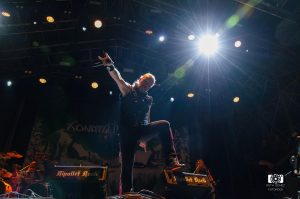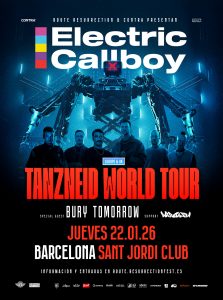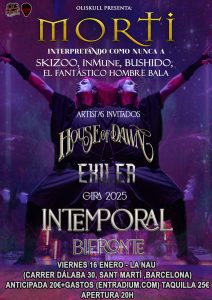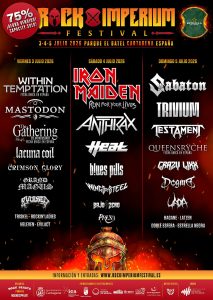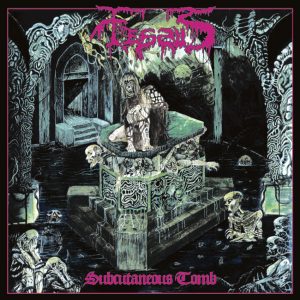DOLMEN GATE: Echoes of Resistance: Heavy Metal’s Battle Against Empires and Conformity

In a world where history and mythology intertwine with the struggles of modern resistance, Dolmen Gate crafts anthems that challenge narratives of empire and conformity. This interview delves into their reflections on Portugal’s complex colonial legacy, the power of storytelling in metal, and the unyielding spirit of rebellion that defines their music. With their roots firmly planted in epic metal and their eyes set on challenging oppressive systems, Dolmen Gate invites us to step through their gateways of eternity and confront the forces that shape our world.
Hi, first off, thanks for answering our questions. How’s everything going in the lair of Dolmen Gate? How was your recent appearance at the Skulls of Metal festival?
Alex: Hi there! Our recent appearance at Skulls of Metal was a good chance to play in Spain again and catch up with some new and old friends. As for the concert, it could have been better but that’s musician talk, never completely satisfied hahaha. Spain has a more active heavy metal scene and it’s definitely good to play there.
Ana: Hi! It was a pleasure to play in such a good festival, with a great lineup, and an incredible public hungry for heavy metal!
Alex: In regards to our plans, we have been eagerly preparing our next album, which will be recorded in February /March next year. Working hard on the new songs, trying to combine a diverse yet pure epic metal album, and I think we will succeed in creating a better album! So that has been our main focus these times.
Your band’s name, Dolmen Gate, evokes images of ancient thresholds. How do you see your music as a threshold between different cultures, especially given Portugal’s complex imperial history?
Alex: Well I guess the imaginarium of Dolmen Gate is truly a reference to the old times, times of mystery and raw beliefs, and our culture has a part of that as well. Not quite exactly exalting the glorious past (more the opposite), but reminding the various tribes and cultural heritages from the celts, romans, north africans and all the groups of people that stepped on this soil and helped to forge the language and the culture. What we are, may the traditionalist like it or not, is a result of that mix. Having that said, we are also interested in other cultures such as the old Britain, celts, carthaginians etc, and their resistance towards the roman empire.
In light of Portugal’s imperial past, how do you approach themes of colonialism in your lyrics? Do you see your music as a way to confront or reflect on this legacy?
Alex: Well, I’m just gonna give my shot on this. As one of the lyricists, I think the one that wrote more lyrics (we have various contributors on that section), not sure, we don’t directly approach that phase of history. There are several bands that already talked about the medieval and the so-called “discoveries”, some critically like Maiden, others just praising the “ conquistadores”, so I don’t feel attracted to exploring that theme. Now what we definitely try to tell is the history from the resistance point of view, Rest In Flames portrays the resistance of locals of Coimbra against the Romans, Retribution verses about Boudicca, a woman that led and resisted Romans in Iceni (now Norfolk). So we don’t approach that historical phase (yet), but if we get there, knowing me and my pals, don’t expect exaltation of what was a troubled period full of errors, slaying and abuses, contrary to what is portrayed in Portugal as an almost harmonious process.
As you prepared for your debut album, Gateways of Eternity, what were some of the most exciting and challenging moments during the creation process? How did these experiences shape the final product?
Alex: In my end, I always find the most challenging moments are choosing the parts and the debates between us in order to make the best song possible, cutting the fat and focusing on what we can bring to the people. Very rarely does a song come from the creator without me or someone else nagging the creator about changing something ahahah, which I think is a healthy and horizontal way to create music and getting everyone involved.
Ana: I agree with Alex, I believe the biggest challenge is the creative process, creating a song everyone is happy with, but I think it has always been a smooth process, with everyone’s contribution. From my perspective, having an instrumental track to put voice in is always an exciting thing, and trying to create the voice melodies the song is asking for, not only keeping my singing style, but also building a bridge between the music and the lyrics, trying to convey the right emotion. I really enjoyed the recording sessions, it gives you a sense of completion.
Alex: When it comes to the drums, it’s always a big challenge to find the right rhythms to improve the song, even if I always try to serve the song and not complicate too much (I’m not exactly a prog drummer so I don’t take that risk in consideration). Of course the background of each instrument player has an influence, and the fact I was raised on punk does show sometimes on more direct and raw approaches, hopefully well applied ahaha.
The title Gateways of Eternity suggests exploration and transformation. What deeper meanings do you hope listeners take away from this title in relation to the themes of the album?
Alex: I think everyone has a personal relation with the lyrics, and I found out there’s a magic in that, even greater than knowing what the writer intended. I remember discussing with our guitar player the meaning of a song from Sumerlands, and it meant 2 different things for us. His vision corresponded to the correct interpretation, I later found out, but in the meanwhile I made that song mine by adding that layer of imagination. So I do hope people engage with their own interpretation of tales, the endeavour of glory, resilience and awareness, maybe put themselves on the character’s rolle? Or even, and I’m being maybe too optimistic, help to destroy the conformity idea that things never change, cause they do. In general lyrics are more descriptive of events, but there’s always a personal touch, and on the next album there will be some more ambiguous and personal lyrics, always filled with epic landscapes from past or fictional worlds. The sense of something bigger than us, not a god but the nature elements ,the universe.
Ana: From my perspective, the album’s title and even the band’s name, are suggestive of the themes listeners can find in Gateways of Eternity. The imaginary of dolmens, as burial chambers as they were, being a gateway to eternity, the passage to the unknown. We dwell in journeys to death, like in Horizon’s Call and The Oath, willingness to die in order to resist, like in Betrayal, Rest in Flames and Retribution, and we add a fantasy and old mythology touch in The Wheel. Besides, we tell tales of past times and lost civilizations, which remain alive today and for all eternity.
Many epic tales are traditionally framed through masculine perspectives. How does having a female vocalist change the dynamics of these narratives in your songs? Do you think it adds a new dimension to the stories you tell?
Ana: While we do have some lyrics about battles and roles traditionally associated with men, I believe our songs in most cases don’t clash with having a female voice telling the tale. Retribution is a story about a woman warrior, Boudicca, and most of the other songs about battles and resistance tell a story from the oppressed people’s perspective. I also think the way the vocals entwine with the music gives a mystical feeling, almost like an otherworldly entity telling a story. And then, lots of our songs are about the journey to death and making peace with it, which is a universal theme and devoid of gender roles.
The cover artwork of Gateways of Eternity is striking. How did you collaborate with the artist to ensure that the visuals align with the themes and emotions of the album?
Ana: Interestingly, the cover artwork was a fortuity, as Nuno had bought the illustration from the artist, Márcio Blasphemator, a long time ago, when Dolmen Gate was not even an idea yet. When he showed us the artwork, we all felt it fit perfectly with the themes in the album, besides being a beautiful piece of art. I personally love the fact that it still conveys an epic feeling without being graphically about battles and men fighting each other. I think the emotions we try to pass through our music go far beyond violence and bloodshed, but explore the reasons leading to it, and the feelings that may come from it, such as hope, despair, rebellion, resignation, and so on.
Many of your songs draw on mythological and historical themes. How do you reinterpret these narratives to resonate with modern listeners, and what message do you hope to convey?
Alex: When I write lyrics I focus on different things. The human aspects of war and conflict: hope, audacity, revenge, all the forces that lead people to rebel, the sense of community and the reach for a common goal. Besides that, there’s the victory and the resistance of the underdogs against dominant empires. Nowadays the dominant empires are others, and there’s definitely something to be learned by the constant change from the bronze age till now: as Atlantean Kodex say, empires rise, empires fall. Resistance is the engine of change, and we must resist the oppressors nowadays as they did in the past.
As you weave complex narratives in Gateways of Eternity, how do you envision the role of storytelling in metal evolving? What do you hope your work contributes to the broader dialogue about narrative forms in the genre?
Alex: Well, let me tell you honestly that with the amount of bands that come everyday (every time I go to the New Wave of Traditional Heavy Metal page I always find a couple), I don’t think we will have the reach or pretensions to “contribute” to any change on that. Nevertheless, as i mentioned before, the fact that we took the perspective of the resistance is what makes us different probably, instead of the old same glorification of our culture and past (crusader from saxon is an example, love that song though).
Regarding the style of writing, we often write as being on the protagonist’s skin, at least that’s what most of our lyrics intend to.
And finally, what’s in store for the future?
Alex: We want to keep paying tribute to the sacred heavy metal,even if nobody knows what will come. We have fun when we play and when we compose. We had a wonderful reaction to our first album, with the appearances on Up The Hammers and Keep It True being a good push in such an early stage. What we want is to continue and be able to play abroad, even though we always have specific difficulties, having a band outside the inner circle of heavy metal, and living in the bottom of Europe is a piece of resistance by itself. Personally, I have dealt with it in many bands like Midnight Priest and Ravensire, and like it happens in many other sectors here, we are on the periphery of the heavy metal scene, symbolically and geographically. We are more expensive to book for concerts, and all that handicaps that come along. But at the end of the day what drives us is nothing but passion for Sacred Metal, and as long as we have that we march forward!
That’s all from our side. Thanks again for answering these questions. If you’d like to add any final thoughts, the floor is yours.
Thanks a lot for this opportunity to speak our minds. Stay tuned, we’re preparing new music with more tales of resistance to oppression.
Follow Dolmen Gate on Instagram @dolmengate, on Facebook at https://www.facebook.com/DolmenGate and on bandcamp https://dolmengate.bandcamp.com/

